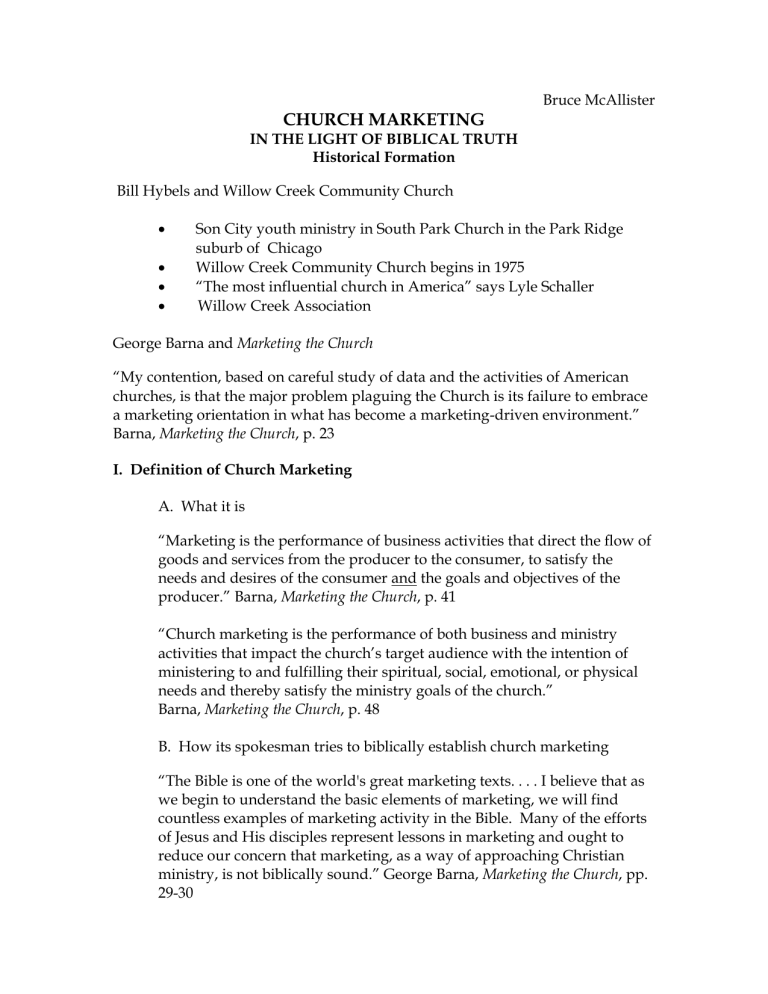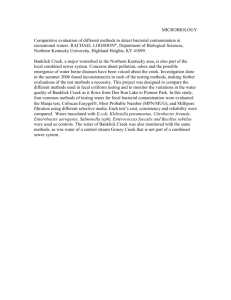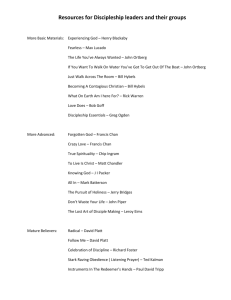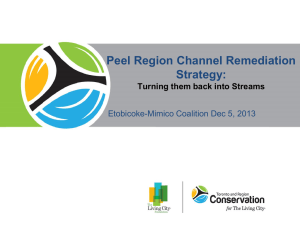Bruce McAllister - Preserving the Truth Conference

Bruce McAllister
CHURCH MARKETING
IN THE LIGHT OF BIBLICAL TRUTH
Historical Formation
Bill Hybels and Willow Creek Community Church
Son City youth ministry in South Park Church in the Park Ridge
suburb of Chicago
Willow Creek Community Church begins in 1975
“The most influential church in America” says Lyle Schaller
Willow Creek Association
George Barna and Marketing the Church
“My contention, based on careful study of data and the activities of American churches, is that the major problem plaguing the Church is its failure to embrace a marketing orientation in what has become a marketing-driven environment.”
Barna, Marketing the Church, p. 23
I. Definition of Church Marketing
A. What it is
“Marketing is the performance of business activities that direct the flow of goods and services from the producer to the consumer, to satisfy the needs and desires of the consumer and the goals and objectives of the producer.” Barna, Marketing the Church, p. 41
“Church marketing is the performance of both business and ministry activities that impact the church’s target audience with the intention of ministering to and fulfilling their spiritual, social, emotional, or physical needs and thereby satisfy the ministry goals of the church.”
Barna, Marketing the Church, p. 48
B. How its spokesman tries to biblically establish church marketing
“The Bible is one of the world's great marketing texts. . . . I believe that as we begin to understand the basic elements of marketing, we will find countless examples of marketing activity in the Bible. Many of the efforts of Jesus and His disciples represent lessons in marketing and ought to reduce our concern that marketing, as a way of approaching Christian ministry, is not biblically sound.” George Barna, Marketing the Church, pp.
29-30
“It surprises some church leaders to hear that evangelism is a form of marketing. To leaders who hold a negative view of marketing, that certainly sounds heretical! We do not generally think of sharing our faith with other people as an adventure in marketing, but think about it. A believer engages a nonbeliever in dialog with the intention of seeing some type of active response to the shared information. After some discussion, both parties attempting to understand the needs and expectations of the other, the listener decides, either to accept or not accept Christ as Savior at that point in time. Regardless of the outcome, a marketing event has transpired. And when one individual leads another to accept Christ as
Savior, a marketing transaction has occurred.” Barna, Church Marketing, p. 20
C. How church marketing relates to other movements
1. Church growth movement
Donald McGavran (Fuller Theological Seminary) “Since people prefer to come to faith without crossing linguistic or cultural barriers, mission strategy should focus on discrete groups and be timed to meet people’s openness to the gospel.” Dictionary of Christianity in
America (Downers Grove: InterVarsity Press, 1990), p. 271. Robert
Schuller claims to be father of the church growth movement, though this is disputed.
2. Megachurch movement
“Mega” refers to size (2000+), not necessarily ministry philosophy and strategy. Many large churches use a strong marketing philosophy, but not all do.
D. Are there any positive contributions from church marketing?
1. Market surveys provide quantitative and qualitative data regarding how people are thinking.
2. Marketing information helps the church to better understand hwo to use publicity effectively.
3. Marketing strategy demonstrates the importance of planning, communicating, executing, and evaluating our efforts. (These functions are legitimate and do not necessarily have to be defined as subcategories of marketing.)
4. Marketing enhances our alertness to how a newcomer responds when he attends our services.
E. How to recognize typical results of a church marketing philosophy
1. Target audience
2. Seeker services
3. Conversational/relational sermons
4. Regular use of contemporary drama
5. Heavy use of CCM and other musical forms
“A pet peeve of mine is our inexplicable reluctance to use contemporary
Christian music (CCM) as a means of attracting non-believers and as a means of encouraging, challenging and teaching believers. . . . Why do we so stubbornly reject CCM as a growth and evangelism tool? From what
I've been able to determine it is partially a response to the ‘rock music is of the Devil’ philosophy; partially because so many pastors and church leaders are older and cannot really relate to the music of younger people; partly a consequence of seminaries training pastors to think that it is their preaching that saves people, and their home visitation practices that make the Bible clear.” Barna, Ten Years Later, 1992, p. 130
“Saddleback [Valley Community Church] is unapologetically a contemporary music church. We've often been referred to in the press as
‘the flock that likes to rock.’ We use the style of music the majority of people in our church listen to on the radio. . . . . Within a year of deciding what would be ‘our sound,’ Saddleback exploded with growth.”
Rick Warren, pastor of Saddleback Valley Community Church and author of The Purpose Driven Church (Grand Rapids: Zondervan Publishing
House, 1995), p. 285
“Unchurched people today are the ultimate consumers. We may not like it, but every sermon we preach, they’re asking, Am I interested in that
subject or not? If they aren’t, it doesn’t matter how effective our delivery is; their minds will check out. A few years ago the book Real Men Don’t Eat
Quiche came out, and immediately sales took off. Everyone was talking about it. As I was thinking about the amazing success of that book, I decided to preach a series entitled, ‘What Makes a Man a Man? What
Makes a Woman a Woman?’ Unchurched people heard the titles, and they came; attendance climbed 20 percent in just four weeks. The elders were saying, ‘This is incredible!’ When that series ended, I began one titled ‘A
Portrait of Jesus.’ We lost most of those newcomers.” (Bill Hybels,
“Speaking to the Secularized Mind” in Mastering Contemporary Preaching,
(Portland: Multonomah, 1989), p. 31
II. Dangers of Church Marketing
A.
Church marketing is rooted in Robert Schuller’s heretical theology
“Historical theology has dictated and directed that the starting point for many theologians and Christian leaders will be the
Scriptures. That sounds sensational. Who would challenge that?
Yet history shows that, as a starting point, disagreement over interpretations of Scripture lead to divisiveness. . . . . Other classical systematic theologians would begin with the doctrine of
God. But this is part of the reason the church is in the predicament it is in today. . . . . We can never communicate until we establish a fresh starting point that transcends historical theological differences. Yes, what we need today in the worldwide Christian church is nothing less than a new reformation. Where the sixteenthcentury Reformation returned our focus to sacred Scriptures as the only infallible rule for faith and practice, the new reformation will return our focus to the sacred right of every person to self-esteem!
The fact is, the church will never succeed until it satisfies the human being’s hunger for self-value.” Robert Schuller, Self-Esteem:
The New Reformation (Waco: Word Books, 1982) p. 36
1. “Sin. Reformation theology failed to make clear that the core of sin is a lack of self-esteem. If the goal of salvation is to ‘glorify
God,’ then the solution must result in restoring self-respect, selfesteem, self-worth, and a noble pride in persons” (Schuller, pp. 98-
99).
2. “Salvation. What does it mean to be saved? It means to be permanently lifted from sin (psychological self-abuse with all of its consequences as seen above) and shame to self-esteem and its Godglorifying human need-meeting, constructive, and creative consequences.” (Schuller, pp. 98-99)
“To be born again means that we must be changed from a negative to a positive self-image--from inferiority to self-esteem, from fear to love, from doubt to trust.” (Schuller, p. 100)
In the fall of 1976 Hybels and staff met in Schuller’s office and received significant inspiration for their new ministry: “As I look
back through the years I can’t help but think that what happened that day was exactly what we thought it was at the time: a divinely staged encounter. We returned home changed. We had been given a glimpse of the future, an augmented sense of destiny, and it catapulted us forward” (Lynne and Bill Hybels, Rediscovering
Church, p. 69).
In the fall of 1979 Robert Schuller spoke at a Willow Creek fundraising banquet for the purchase of their church campus.
Bill Hybels has spoken frequently at Schuller’s Institute for
Successful Church. Rick Warren has also spoken at the conference.
Schuller views Hybels as the golden example of successfully doing what Schuller advocates, though Hybels and Willow Creek are reticent to admit the connection. (G.A. Pritchard, Willow Creek
Seeker Services, p. 56. See pages 49-58 for Schuller’s influence upon
Hybels and Willow Creek.)
B.
Church marketing’s self-declared intention is to please men (or to not displease men).
1.
The marketing methodological approach to starting both the
Crystal Cathedral and Willow Creek fits the self-esteem psychological approach.
(Pritchard, pp. 55-56)
2.
Paul clearly denounced such an approach: a. “For do I now seek to persuade men, or God? Or do I seek to please men? For if I yet pleased men, I should not be the servant of
Christ.” (Gal. 1:10) b. “not as pleasing men, but God, which trieth our hearts” (I Thes.
2:4) c. “For we are not as many, which corrupt the word of God: but as of sincerity, but as of God, in the sight of God speak we in Christ”
(II Cor. 2:17)
“It is characteristic of these intruders that they go about hawking or peddling the word of God, cheapening and degrading the message by the illegitimate admixture of foreign elements, judaistic or
pagan, as a dishonest merchant adulterates wine with water; they seek only their own gain, irrespective of the effect of their teaching on others and careless of the momentous issues which are at stake; self-interest governs their outlook . . . “ Phillip Hughes on II
Corinthians 2:17 in the New International Commentary (Grand
Rapids: Eerdmans Publishing Company, 1962), p. 83.
3.
The man-pleasing philosophy and methodology determines the approach to: a.
The format of the weekend seeker services. b.
The musical selections for the seeker services. c.
The worldly, entertainment culture of the services. d.
The preaching content and approach.
4.
The marketing philosophy brings disastrous results.
“The American Church is the world’s primary exporter of cheap grace. At some point, though, poor products come back to haunt the producer. Welcome to the haunting time.
At what point do we bite the bullet and acknowledge that God does not need a majority to accomplish His will, instead He seeks people who will surrender their own grand plans in order to live for Him? When do we get to the point at which we accept smaller numbers of intensely devoted people rather than feverishly investing in filling auditoriums and stadiums with massive numbers of the lukewarm “Christians” that Jesus promised to spew from His mouth (Rev. 3:16)? What might cause us to acknowledge that, yes, faith in God is good, but even the demons believe in God
– and that it takes more than a naïve, inch-deep faith in Christ to become part of a Church that truly honors God?”
George Barna in The State of the Church: 2002, p. 127
5.
Dr. David M. Doran evaluates the problems of church marketing in his excellent article "Market-driven Ministry: Blessing or Curse" in
Detroit Baptist Theological Journal, Fall 1996, Vol. 1, No. 2. See his main points below. http://dbts.edu/journals/1996_2/market2.pdf
The Foundational Premises of Ministry Marketing are Man-Centered
The Purpose for Ministry in a Marketing Orientation Is Man-Centered
The Confidence About Ministry in the Marketing Orientation Is Man-
Centered
The Evangelistic Strategy of a Marketing Orientation Is Man-Centered
Evangelism Built on Felt Needs Undercuts the Authority of the Gospel
Message
Evangelism Built on Felt Needs Undermines the Content of the Gospel
Message
The Pragmatism of the Marketing Movement is Flawed
It Is Pragmatic in Its Determination of Success
It Is Pragmatic in Its Selection of Methods
It Is Pragmatic in Its Interaction with Culture
The Movement is Deceived by Cultural Relativism
The Movement has Surrendered to Popular Culture
“And I, brethren, when I came to you, came not with excellency of speech or of wisdom, declaring unto you the testimony of God. For I determined not to know any thing among you, save Jesus Christ, and him crucified. And I was with you in weakness, and in fear, and in much trembling. And my speech and my preaching was not with enticing words of man's wisdom, but in demonstration of the Spirit and of power: That your faith should not stand in the wisdom of men, but in the power of God.” (I Corinthian 2:1-5)
R
ESOURCES FOR
F
URTHER
S
TUDY
Some of these books are primary sources promoting marketing, while other books provide evidence of the negative reaction to church marketing. No endorsement is implied by inclusion.
Barna, George. Marketing the Church. Colorado Springs: Navpress, 1988.
Barna, George. User Friendly Churches. Glendale: Regal Books, 1991.
Barna, George. Church Marketing: Breaking the Ground for the Harvest. Ventura:
Regal Books, 1992.
Barna, George. Ten Years Later. Glendale: George Barna, 1992.
Barna, George. The State of the Church: 2002. Ventura: Issachar Resources, 2002.
Doran, David M. "Market-driven Ministry: Blessing or Curse" in Detroit Baptist
Theological Journal, Spring 1996, Vol. 1, No. 1.; Fall 1996, Vol. 1, No. 2. See articles at http://www.dbts.edu/media/journals/index_art.asp
Hybels, Bill and Lynne. Rediscovering Church: The Story and Vision of Willow Creek
Community Church. Grand Rapids: Zondervan, 1995.
MacArthur, John. Ashamed of the Gospel. Wheaton: Crossway Books, 1993.
Pritchard, G.A. Willow Creek Seeker Services: Evaluating a New Way of Doing
Church. Grand Rapids: Baker Books, 1996. The single best evaluation of the effects of Willow Creek’s philosophy.
Shawchuck, Kotler, Wrenn, Rath. Marketing for Congregations. Nashville:
Abingdon Press, 1992.






